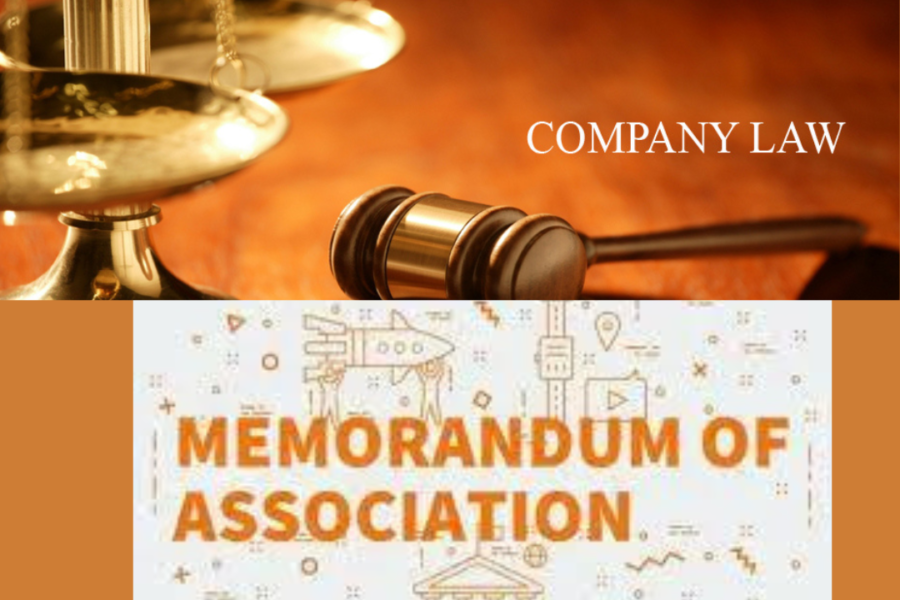The Memorandum of Association (MOA) is a pivotal document that serves as the constitution of a company, outlining its objectives, powers, and the scope of its operations. Under the Companies Act, 2013, the MOA holds significant importance, as it governs the fundamental aspects of a company’s existence and ensures that it operates within the legal boundaries prescribed by the law.
Sections 4 & 5 of the Companies Act, 2013, deal with the Memorandum of Association and its contents, respectively. Section 4 (1)(c) mandates that the MOA must be subscribed by at least seven individuals in the case of a public company and two individuals in the case of a private company. The requirement ensures that the company’s formation is backed by a collective commitment and accountability.
Section 5(1) outlines the essential components that must be included in the MOA, such as the company’s name, its registered office address, objects (the purpose for which the company is formed), liability clause (whether limited or unlimited), and the capital clause (the amount of share capital and its distribution). These elements collectively define the company’s identity, objectives, and operational boundaries.
Section 4(6) of the Act allows for the alteration of the MOA, subject to certain Conditions. Any alteration must be approved by the shareholder through the special resolution, and the company must comply with the procedural requirements prescribed by the act and its rules. However, the alteration must not result in the conversion of a public company into a private company or vice versa, as per section 13(8).
The MOA plays a crucial role in determining the validity of a company’s actions. Section 6 of the act states that any act or transaction undertaken by a company that goes beyond the objects specified in the MOA shall be void unless ratified by the shareholders through a special resolution. This provision further reinforces the importance of adhering to the objects outlined in the MOA and ensures that companies do not engage in ultra vires activities.
The MOA also serves as a reference point for resolving disputes between shareholders and the company. Section 7 of the Act empowered shareholders to initiate legal proceedings against the company if it engages in activities that are beyond the scope of its MOA. This provision acts as the safeguard of the interests of shareholders and ensures that the company operates within the boundaries set forth in its constitution.
Land Mark judgement:
- Ashbury Railway Carriage & Iron Co. Ltd v. Riche (1875) :
In this case, The House of Lords established the principle of “ultra vires” which means that a company cannot undertake any activities beyond the objects specified in its MOA. This ruling emphasized the importance of the MOA as the guiding document that sets the limits on a company’s actions and protects the interests of the shareholders and creditors.
- S. Govinda Menon v. Bombay Suburban Municipal Corp. (1966) ;
The Supreme Court reiterated the significance of MOA and the principle of Ultra Vires. The court held that the company cannot engage in activities that are not covered by the objects specified in its MOA, even if those activities are considered incidental or ancillary to its main objects
.
Furthermore, the Companies Act, of 2013, has introduced the concept of “One Person Company” (OPC) in Section 2(62). An OPC is a company with a single member, and its MOA must explicitly state that it is an OPC. This provision recognizes the growing trend of entrepreneurship and provides a legal framework for individuals to establish and operate their businesses as separate legal entities.
In conclusion, the Memorandum of Association is a fundamental document that defines a company’s identity, objectives, and operational boundaries under the Companies Act, 2013. Its significance has been reinforced through various provisions and landmark judgments, ensuring that companies operate within the legal framework and protect stakeholders’ interests. The MOA serves as a guiding light for companies, enabling them to navigate the complexities of the corporate world while maintaining transparency and adherence to the principles of good corporate governance.
contributed by; Devesh Modi
ICFAI LAW SCHOOL (2022-2025)


**mitolyn official**
Mitolyn is a carefully developed, plant-based formula created to help support metabolic efficiency and encourage healthy, lasting weight management.